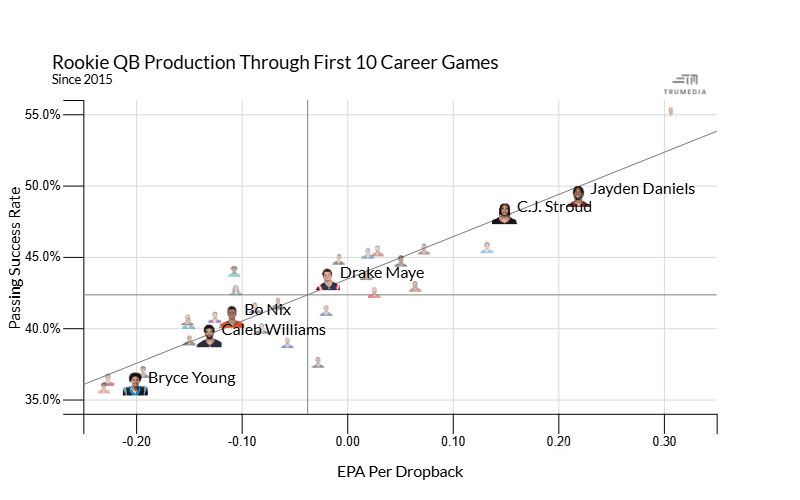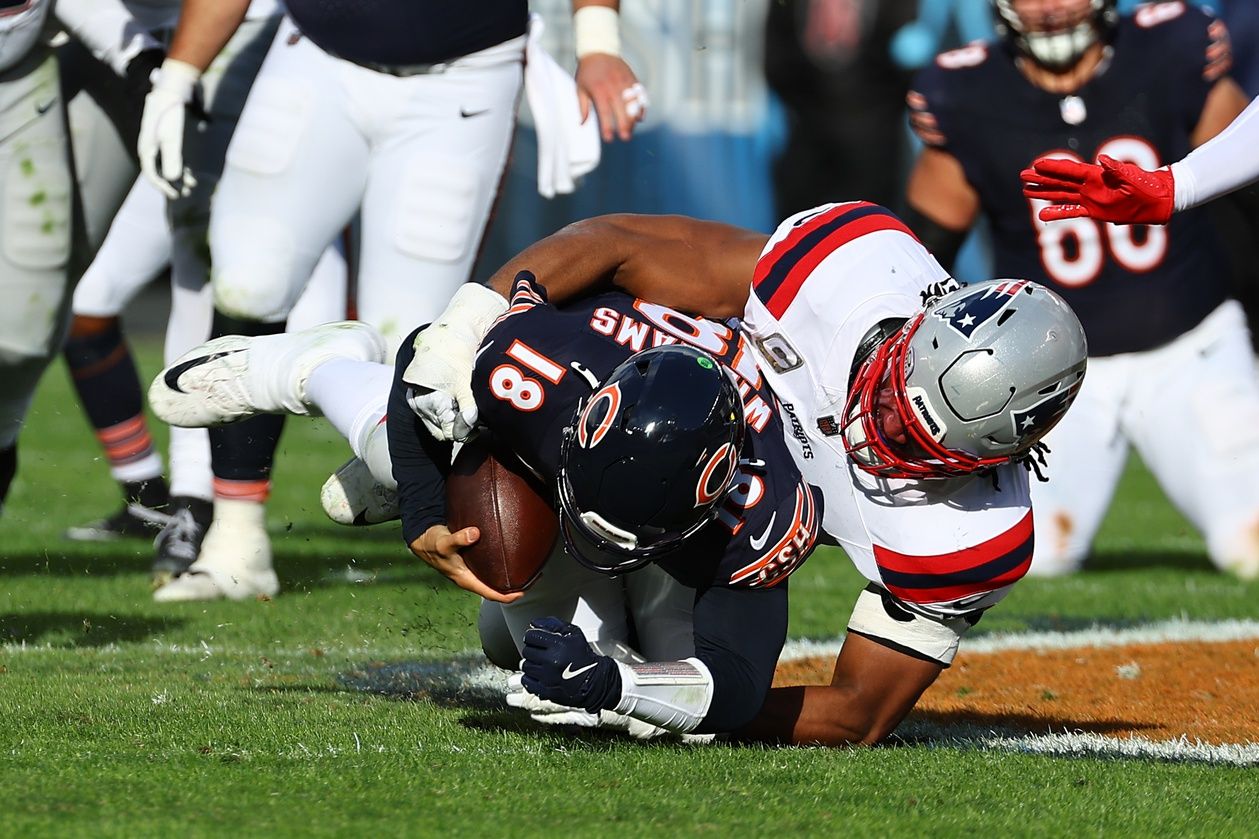In the same week that the Indianapolis Colts are turning back to Anthony Richardson under center, the Chicago Bears are facing calls to bench their own first-round quarterback.
Is Caleb Williams really in danger of losing his starting job for the Bears? Who’s up next in Chicago? And just how unproductive has Williams been over the last several weeks?
Let’s dive into all those questions as the Bears try to determine how to move forward on offense.

Are the Bears Considering Benching QB Caleb Williams?
While Williams has undoubtedly struggled over the past month or so, the Bears don’t seem to be giving any real thought to benching the No. 1 overall pick in April’s draft.
Chicago already made one significant change earlier this week by firing offensive coordinator Shane Waldron and promoting passing game coordinator Thomas Brown into a play-calling role. But sitting a former Heisman winner like Williams after just 10 career starts isn’t on the table for head coach Matt Eberflus.
“Caleb is our starter,” Eberflus said on Monday.
On Tuesday, ESPN Radio’s Mark Silverman reported that several veteran players had asked the Bears to start backup quarterback Tyson Bagent over Williams.
After talking to a few people with knowledge of the situation, players went to Matt Eberflus & Ryan Poles asking them to make a change at offensive coordinator.
There have also been a few veteran players requesting Bagent starts. https://t.co/h3QSrhZjQ1— Silvy (@WaddleandSilvy) November 12, 2024
It’s a poor look for a franchise that has spent decades trying to find a franchise signal-caller and repeatedly failed to support former first-rounder Justin Fields. We’ll get into Williams’ statistical struggles, but he’s had to deal with a now-fired offensive play-caller and one of the NFL’s worst offensive lines.
Bagent has been a surprisingly effective backup quarterback. He made four starts in 2023, and if you didn’t know his biography, you wouldn’t have known you were watching an undrafted rookie free agent out of Division II Shepherd University. Pro Football Network ranks him as the NFL’s No. 17 backup QB.
But the idea of turning to Bagent after Williams has made 10 career starts doesn’t make much sense. The Bears are pinning their hopes on Williams, who needs the rest of the season to work through the issues that have plagued him and Chicago’s offense in 2024.
What the Numbers Say About Williams’ NFL Start
You rarely want to reside in the bottom left corner of a graph like the one below, but that’s where Williams is after 10 games.
Since 2015, only seven rookie quarterbacks have been less efficient than Williams (-0.13 EPA per dropback) through their first 10 NFL starts. You can probably guess some of the players below him.
Zach Wilson and Josh Rosen (-0.15 EPA per dropback) were the worst. Bryce Young is in there. So is DeShone Kizer. It’s not a group you want to be a part of!
It’s a similar story with passing success rate, which measures how consistent a quarterback is on a down-to-down basis. Since 2015, Williams ranks 24th of 31 rookie QBs in success rate through 10 starts, with many of those same disappointing names beneath him.

Williams’ season-long numbers hide the fact that he’s been arguably the NFL’s worst signal-caller since Chicago’s Week 7 bye.
Over the past three weeks, Williams ranks dead last in quarterback efficiency (-0.33 EPA per dropback) and passing success rate (30.9%). He’s completed an explosive pass on just 8.8% of his attempts during that span, the third-worst rate in the NFL. Williams has also been the league’s least accurate QB since Week 8, with a 22.1% off-target rate.
The USC alum received a D grade in PFN’s QB+ system for his Week 8 and 9 performances and a D- for Week 10.
Williams, of course, isn’t solely responsible for the Bears’ offensive struggles. Waldron rarely gave Williams layup opportunities in the passing game and has failed to optimize his weapons dating back to his time as the Seattle Seahawks’ OC.
Look how Seahawks WR Jaxon Smith-Njigba responded when he heard Chicago had hired Waldron this offseason.
this Jaxon Smith-Njigba quote on new Bears OC Shane Waldron cannot be real 💀💀😂😂 pic.twitter.com/KjbQHIl3Vd
— Warren Sharp (@SharpFootball) February 8, 2024
There are other issues with the Bears’ offense. Keenan Allen doesn’t look like the same player, but Waldron had been deploying the 32-year-old as Chicago’s primary receiving option. Allen has been Williams’ first read in the passing game on nearly 40% of his routes (top-12 league-wide).
Meanwhile, the Bears’ already struggling offensive line is dealing with multiple injuries. On Sunday, starting tackles Braxton Jones and Darnell Wright sat out while left guard Teven Jenkins was injured in the game. Chicago, which released 2022 free agent draft bust Nate Davis on Wednesday, is relying on career backups like Larry Borom and Doug Kramer to protect their most critical asset.
Over the past three weeks, Williams has been pressured on a higher percentage of his dropbacks (46.3%) than any other quarterback except for C.J. Stroud. Still, Williams deserves some blame here.
During that span, he’s held for an average of 3.25 seconds, the fourth-longest time to throw since Week 8. Meanwhile, PFF’s charting suggests that Williams has turned 31.6% of his pressures into sacks during this stretch, the highest rate in the NFL.
It’s a chicken-and-the-egg scenario that threatens to upend Williams’ rookie campaign. The Bears’ offensive design has collapsed, and Williams isn’t helping. He’s exacerbated the issues in Chicago by trying to make plays happen out of structure, but the club’s offensive environment rarely puts him in a position to succeed.
Brown might help as he takes the play-calling reins to finish the season, but Williams will likely face more change in 2025. Barring a miraculous turnaround, the Bears will almost certainly fire Eberlus and the rest of the club’s staff heading into next year.
No one would have batted an eye had Chicago started fresh and parted ways with Eberlus after the 2024 campaign. Hanging onto Eberflus, hiring and then firing Waldron, and forcing Williams to slog through this type of rookie experience feels like a massive waste of time at best and the downfall of an all-time QB prospect at worst.

